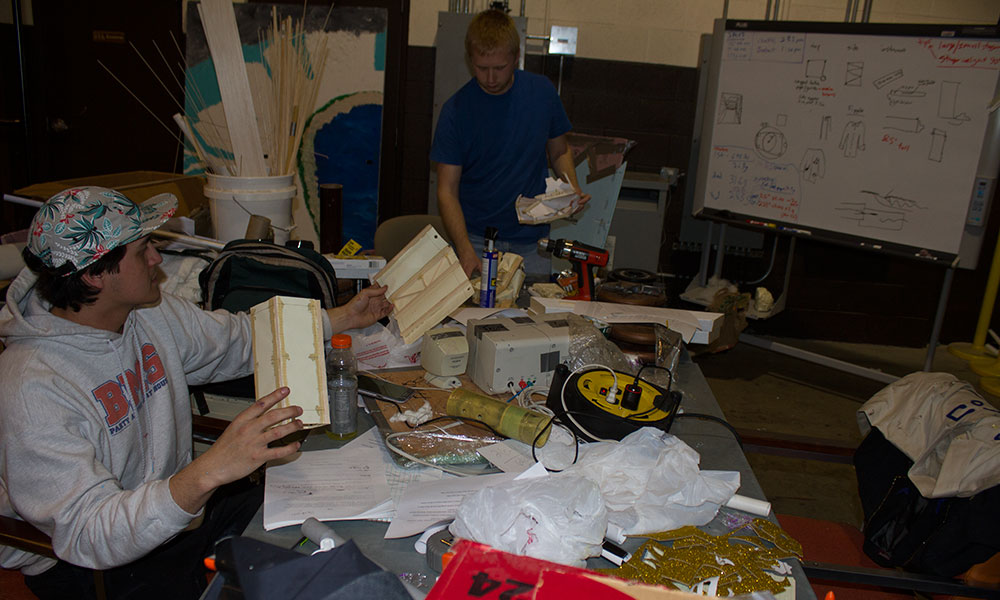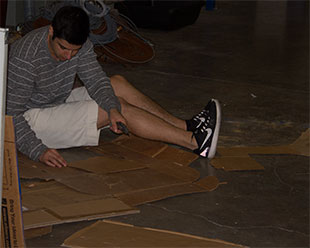Engineers acting? Artists doing science? It's the norm for this group
JMU Destination Imagination team prepares for global finals
Science and Technology
SUMMARY: Teams from JMU, under the direction of Dr. Jonathan Spindel and Dr. Elizabeth Morgan Armstrong, have been winning medals at the competition for the past 11 years. The skits and other challenges the students are preparing for all have a STEM aspect.
Adam Warren dons a pirate costume, grabs his script and takes his place on the stage — actually a section of warehouse floor where Warren and the other members of the cast are preparing for an upcoming competition.
A junior engineering major, Warren seems perfectly comfortable in the role of a wisecracking parrot conversing with the ghost crew of a pirate ship that met an unfortunate fate and sank.
"I think the experience I gain here is going to be relevant to me when I move on to a career," Warren said following the rehearsal. "In the real world as an engineer, I'm going to be working on teams that are (multidisciplinary) like this."
Said Alex Pickens, a junior majoring in economics and English and the author of the script, "I found out I could turn it into one of my honors seminars, so it fulfills some requirements there."
Warren and Pickens are among 22 students preparing for the Destination Imagination Global Finals in May at the University of Tennessee in Knoxville. Destination Imagination is a non-profit organization dedicated to teaching students the creative process through hands-on science, technology, engineering, mathematics and the arts. While most of the 8,000 participants at the Global Finals will be from elementary and middle schools, a number of colleges and universities also field teams.
Teams from JMU, under the direction of Dr. Jonathan Spindel and Dr. Elizabeth Morgan Armstrong, have been winning medals at the competition for the past 11 years. The skits and other challenges the students are preparing for all have a STEM aspect. In the skit Warren and Pickens are part of, a pair of divers use scientific methods to figure out why the ship sank. Another team is preparing for a competition that involves building a structure from balsa wood and paper that can support hundreds of pounds.
The students are responsible for building their sets and creating their costumes as well as preparing for the various challenges.
Hannah Gutman, a fifth-year theatre and dance major, has been part of the JMU DI teams in each of her five years. In fact, Gutman has been participating in DI since elementary school. "I would not be the person I am without DI. From all the duct tape I own to all the silly things I’ve done," she said while dressed in a homemade wedding veil, part of her costume.
 |
Spindel, professor of both integrated science and technology and communication sciences and disorders; and Armstrong, a lecturer of communication studies, created a class around the competition. The class is offered for credit in a number of colleges and departments, including art; communications studies; engineering; the honors program; and integrated science and technology. Students can also belong to JMU's DI Club.
So why should students be interested in DI? Because they work in multidisciplinary teams on real projects with real budgets and deadlines, just like they will when they get jobs, Spindel and Armstrong said.
"It's always really great in job interviews when I bring it up. If someone's heard of it and knows exactly what it is, they tune right in," Gutman said.
"I've never been exposed to anything like this," said Will Clemency, a junior majoring in industrial design and graphic design and who is participating in DI for the first time. "It can be a mental challenge. And you don't even realize it sometimes because it's very hands-on, so I would highly recommend trying it if you like to challenge yourself."
By Rachel Petty ('17), JMU Communications & Marketing
